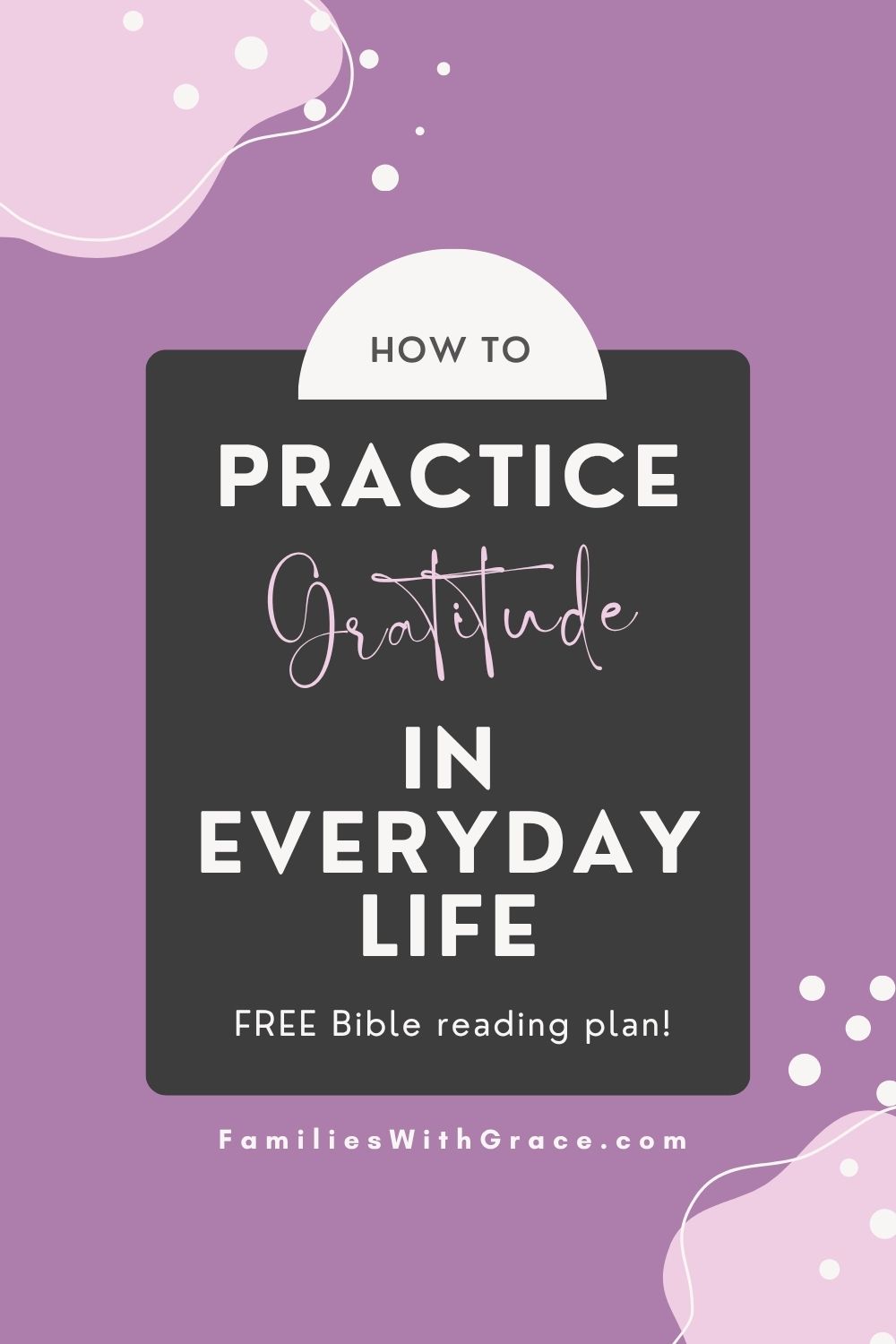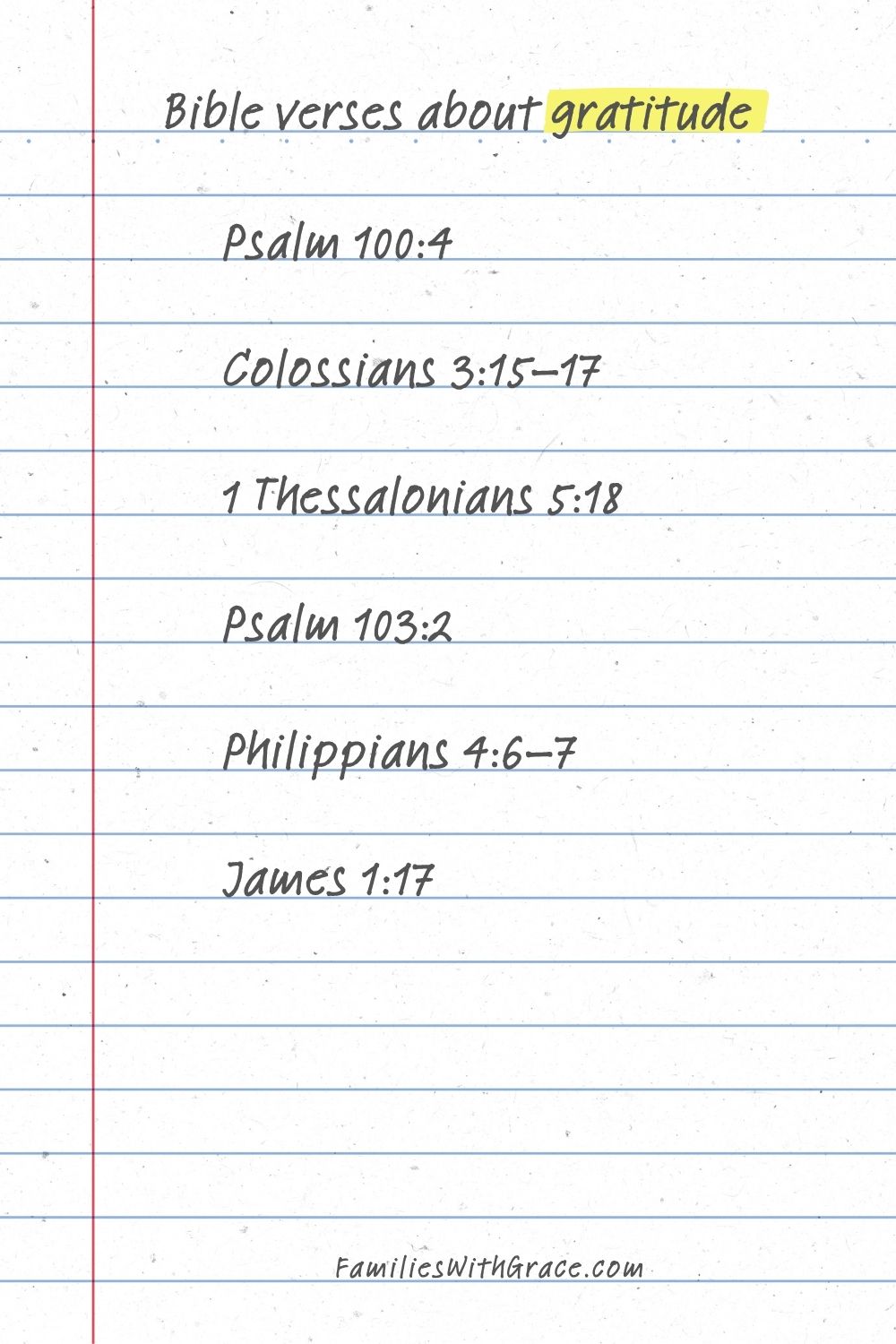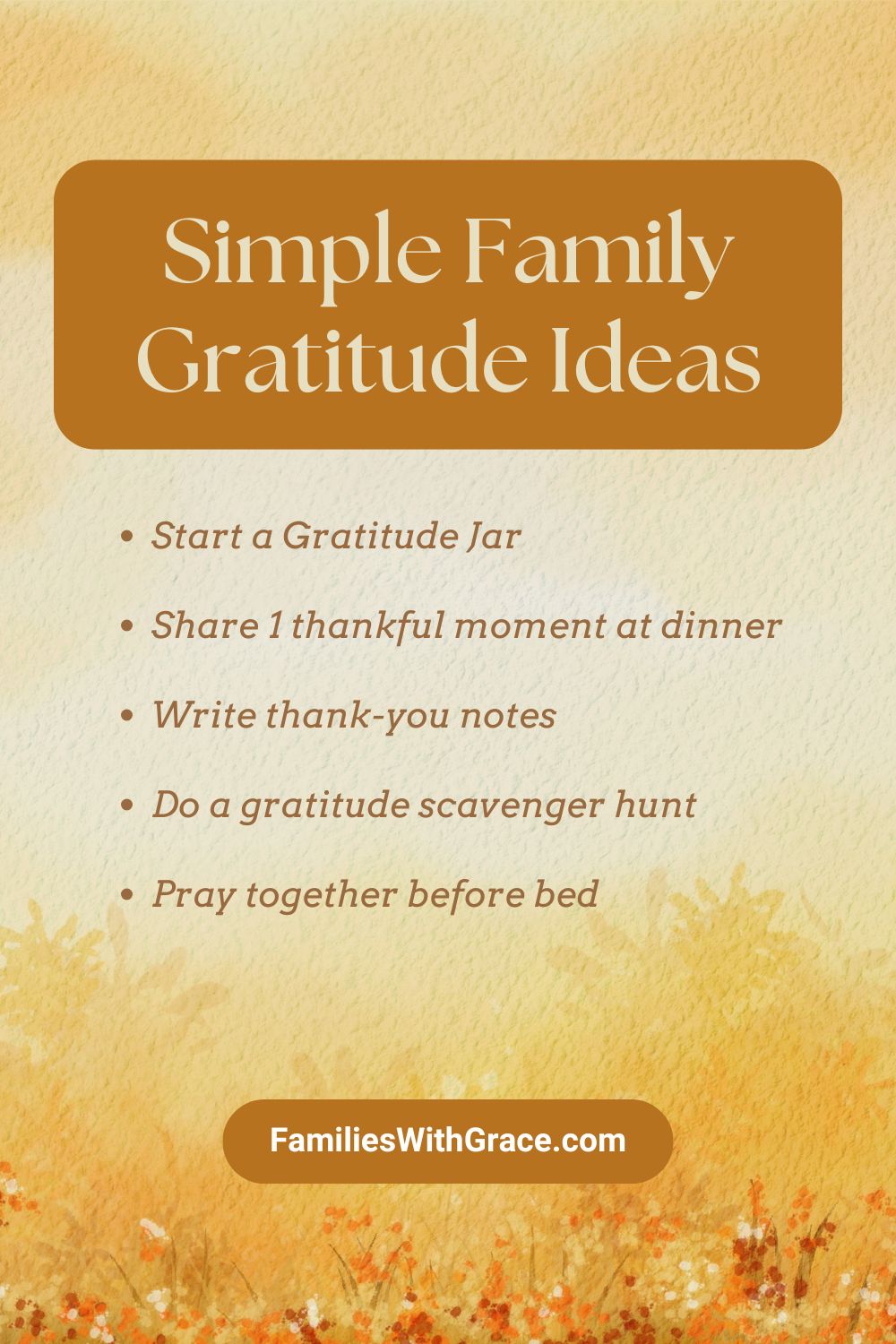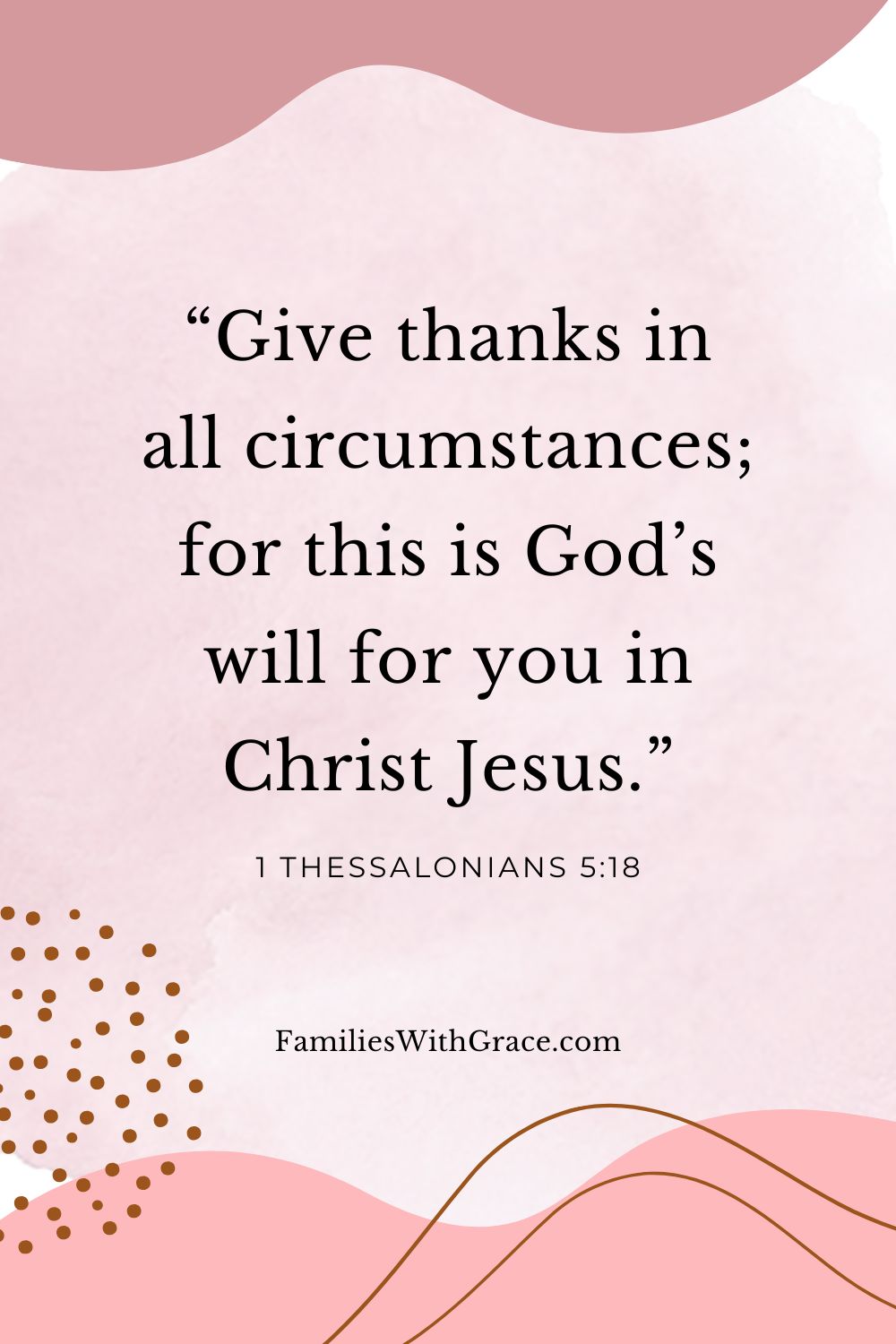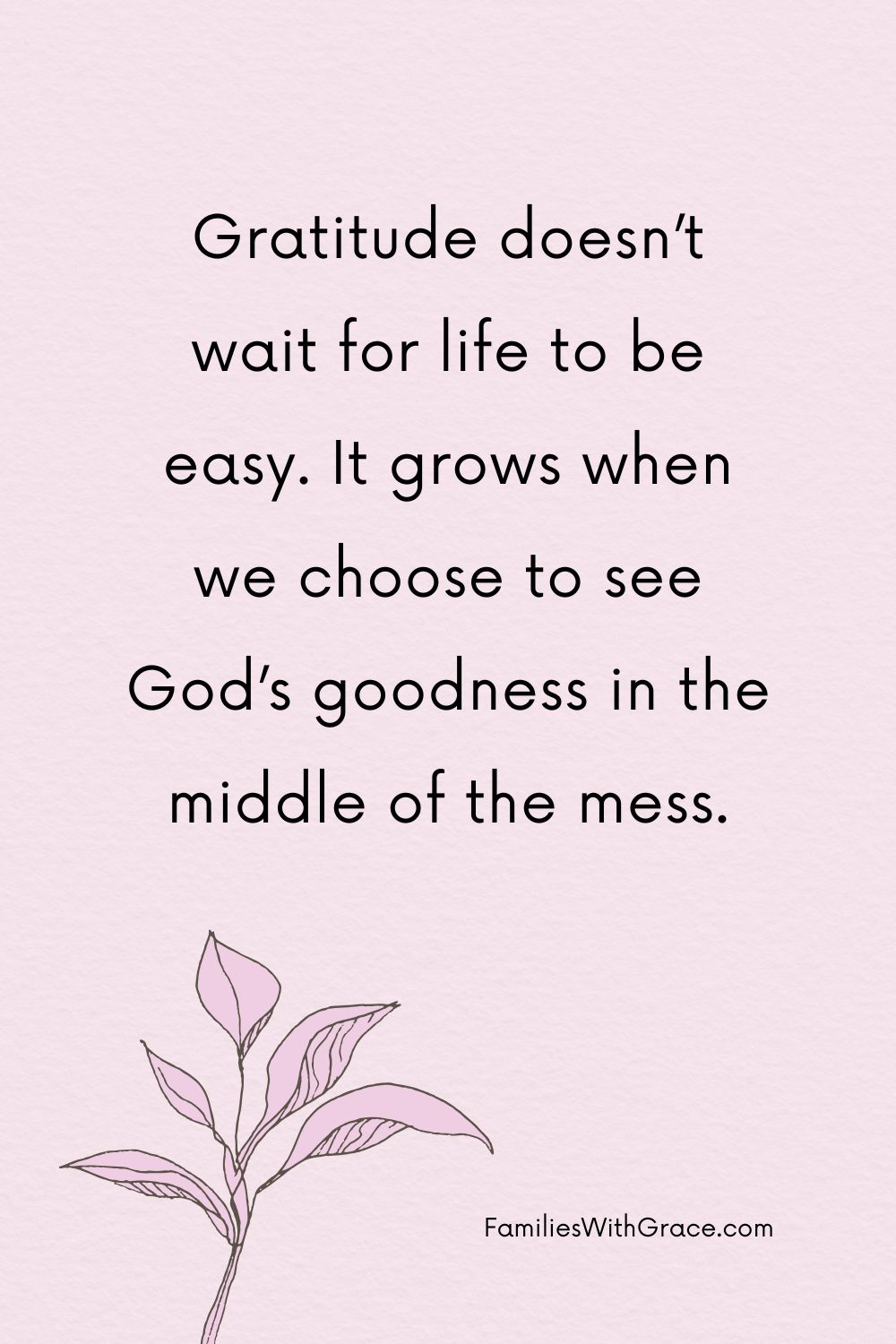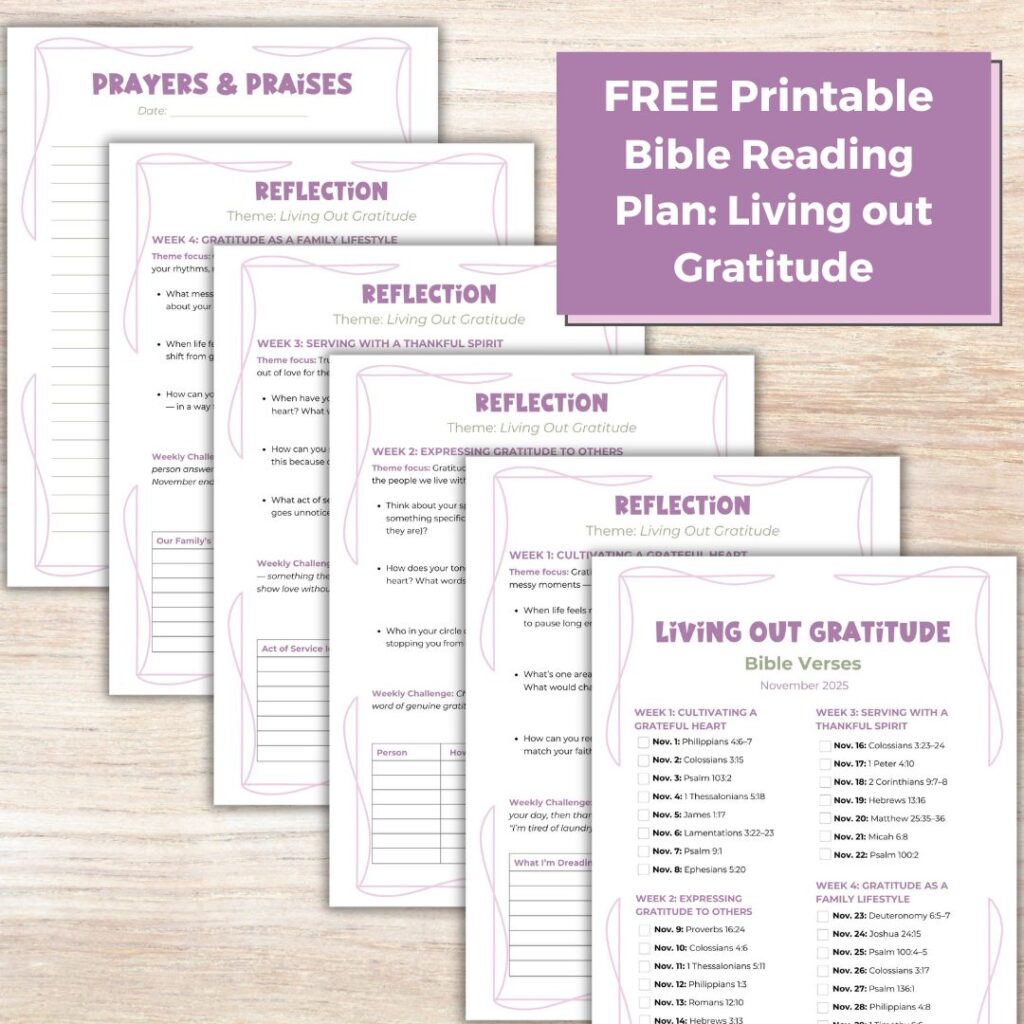Discover how Biblical gratitude transforms everyday family life and strengthens your faith.
Recently, I was driving with my mom and daughter when the car behind us rear-ended us at a stoplight. It had already been a hard few weeks, and this felt like the “icing on the cake.”
My heart raced, but within moments, gratitude started to settle in. We were all OK. The man who hit us was kind and apologetic. Even the cupcakes for my daughter’s birthday party survived the impact.

As we drove away, my mom gently said, “God really took care of us today.” She was right. What could have been a disaster became a reminder of God’s protection and faithfulness.
My daughter chimed in with her own version of thanks, echoing what she’d heard from my mom and me. Three generations, each finding a reason to be thankful in the middle of a frustrating day.
That moment reminded me that gratitude doesn’t wait for life to go smoothly. It grows when we choose to see God’s hand in the small mercies tucked inside messy moments.
But what is gratitude in the Bible, really? Is it just feeling thankful when life is going well? Or is there something deeper? Something that could actually transform how we live, parent and walk with God?
The truth is, Bible verses about thankfulness aren’t just nice sentiments to cross-stitch and hang on our walls. They’re invitations into a way of life that changes everything.
Biblical gratitude isn’t about pretending hard things aren’t hard. It’s about training our hearts to see God’s goodness even when life feels overwhelming.
This November, I’m diving into Biblical gratitude in a fresh way with our free Living Out Gratitude Bible Reading Plan. And I’d love for you to join me as we explore together how a grateful heart isn’t just a nice idea. It’s a spiritual practice that brings peace, joy and deeper connection with Christ Jesus.
Affiliate links are used in this post, if you make a qualifying purchase via my link, I receive a small percentage of the sale at no additional cost to you. It helps support my blog, so thank you for your support! Read my full disclosure here.
What is gratitude in the Bible?
When we talk about what gratitude means in Scripture, we’re talking about so much more than a warm fuzzy feeling. Biblical gratitude is a posture of worship. It’s a deliberate choice to recognize God’s goodness and respond with thanksgiving, regardless of our circumstances.
In the Old Testament, gratitude was woven into the fabric of Israel’s worship. The psalmist declares in Psalm 100:4, “Enter his gates with thanksgiving and his courts with praise; give thanks to him and praise his name.”
Notice that thanksgiving comes first before we even enter into worship. Gratitude isn’t the result of getting everything we want. It’s the door through which we approach the Almighty God.
The New Testament deepens this understanding. The Apostle Paul writes in Colossians 3:15-17 about letting the peace of Christ rule in our hearts and being thankful. He connects gratitude directly to the word of Christ dwelling in us richly.
When we’re filled with God’s Word, thankfulness flows naturally through spiritual songs, through our words and through our actions done in the name of the Lord Jesus.
Biblical gratitude is both an attitude and an action. It’s cultivating a heart of gratitude while also expressing it through the fruit of our lips, good works and a sacrifice of praise. It’s recognizing that every good gift and every perfect gift comes from the Father of lights, who doesn’t change like shifting shadows (James 1:17).
Here’s what makes Biblical gratitude different from the world’s version: it’s not conditional. We don’t give thanks only when life is comfortable. First Thessalonians 5:18 tells us to “give thanks in all circumstances; for this is God’s will for you in Christ Jesus.”
That’s radical. That’s countercultural. And that’s exactly what transforms an attitude of gratitude from a nice idea into a powerful spiritual practice.
When we understand gratitude as the will of God, it changes how we approach difficult times, small frustrations and even the mundane moments of everyday life. It becomes less about our feelings and more about our obedience and trust in God’s character.
Why gratitude matters in motherhood
If motherhood teaches us anything, it’s that we can’t control most of what happens in a day. The toddler meltdown in the grocery store. The science project due tomorrow that we’re just now hearing about. The comparison trap that hits when we scroll past another mom who seems to have it all together.
In the chaos and exhaustion of raising kids, gratitude can feel like one more thing on the list. Gratitude can seem like something we “should” do but don’t have the energy for.
But here’s the beautiful truth: gratitude isn’t another burden. It’s actually one of the best ways God gives us to find peace in the middle of the mess.
When we practice gratitude, something shifts in our hearts and minds. Research shows that grateful people experience better mental health, less anxiety and more resilience in difficult circumstances.
But more importantly, Scripture promises us that when we bring our requests to God with thanksgiving, “the peace of God, which transcends all understanding, will guard your hearts and your minds in Christ Jesus” (Philippians 4:6-7).
That peace isn’t dependent on our circumstances changing. It’s a supernatural gift that comes when we choose to focus on God’s goodness instead of our problems. A grateful heart doesn’t ignore the hard things. It simply refuses to let the hard things have the final word.
The importance of gratitude in motherhood can’t be overstated. When we model thankfulness for our children, we’re teaching them to recognize God’s blessings even in small things. We’re showing them that joy isn’t found in perfect circumstances but in a relationship with a good and faithful God.
And in those moments when we feel like we’re failing at everything else? Gratitude becomes our lifeline. It reminds us that God’s grace is sufficient, His love never wavers and even our imperfect efforts matter when offered with a thankful heart.
How to live out gratitude
Living out Biblical gratitude isn’t about waiting until we feel thankful. It’s about making intentional choices that cultivate gratitude as a way of life. Here are four practical ways to embrace the transformative power of gratitude in your own life and home.
Cultivating a grateful heart
Gratitude starts internally, in the quiet places of our hearts where we choose what we’ll focus on. King David understood this. Even in the midst of being hunted by enemies, hiding in caves and facing betrayal, David wrote psalm after psalm of thanksgiving. His secret? He intentionally turned his attention to God’s character and past faithfulness.
We can do the same. When difficult times hit—and they will—we can train ourselves to look for God’s goodness in the small things. The way the morning light streams through the window. A child’s laughter. A friend’s text message at just the right moment. These aren’t accidents; they’re reminders that God is present and active in our everyday life.
Psalm 103:2 says, “Praise the Lord, my soul, and forget not all his benefits.” Sometimes cultivating a grateful heart means deliberately remembering.
What has God done for you this week? This month? This year? When we make remembering a practice, gratitude becomes our natural response.
Try this: Before your feet hit the floor each morning or before your head hits the pillow each night, name three things you’re thankful for. It might feel mechanical at first, but over time, this small practice trains your heart to notice God’s blessings throughout the very day.
Expressing gratitude to others
Biblical gratitude isn’t meant to stay locked inside us. The Word of Christ dwelling in us should overflow into how we treat our family members, friends and even strangers.
Colossians 3:16-17 connects being filled with God’s Word to speaking to one another with psalms, hymns and spiritual songs as well as doing everything in the name of our Lord Jesus Christ with thanksgiving.
What would it look like to express gratitude more freely in your home? To tell your husband you appreciate how hard he works, even when the little things he does feel invisible to everyone else? To praise your kids for good deeds and kind words, rather than only correcting what they do wrong?
Small ways of showing appreciation create a culture of gratitude in our families. A note tucked into a lunchbox. A genuine “thank you” for helping with chores. Taking time to recognize someone’s effort, even when the result wasn’t perfect.

The Apostle Paul regularly expressed gratitude for the people in his life. His letters are filled with thanksgiving for fellow followers of Jesus for their faith, their love and their partnership in the gospel. When we follow his example, we bless others while simultaneously deepening our own heart of gratitude.
Serving with a thankful spirit
There’s a direct connection in Scripture between gratitude and service. When we truly recognize God’s blessings in our lives—the gift of salvation, God’s unfailing love, His daily provision—the appropriate response is to serve others with joy.
Hebrews 12:28 says, “Therefore, since we are receiving a kingdom that cannot be shaken, let us be thankful, and so worship God acceptably with reverence and awe.”
Our gratitude to God naturally expresses itself through good works done for His glory.
This is where gratitude moves from internal feeling to external action. We serve our families not as a burden but as a sacrifice of thanksgiving.
We look for opportunities to bless others because we’re overflowing with awareness of how we’ve been blessed.
We make a joyful noise in our worship not because we have perfect voices, but because we have hearts full of songs of praise for God’s goodness.
Even in the mundane tasks like folding laundry, making dinner, driving to soccer practice, we can cultivate a thankful spirit by remembering that we serve the Lord Christ (Colossians 3:23-24). Every act of service, done with gratitude, becomes worship.
Gratitude as a family lifestyle
The goal isn’t just personal gratitude. It’s making thankfulness a way of life for our entire family.
When our kids grow up in a home where gratitude is practiced daily, they learn that recognizing God’s faithfulness isn’t something we do occasionally; it’s who we are.
Start small. At dinner, go around the table and let each person share one thing they’re grateful for. Create family traditions around thanksgiving not just in November, but year-round.
Make gratitude activities part of your rhythm: a gratitude jar where family members add notes throughout the week, or a gratitude scavenger hunt where kids look for evidence of God’s love in creation.
The beauty of making gratitude a family lifestyle is that it shifts the atmosphere of your home. Instead of focusing on what we lack or what went wrong, we train ourselves to see the good things God is doing all around us. We become grateful people who naturally point others toward God’s goodness.
Psalm 145:4 says, “One generation commends your works to another; they tell of your mighty acts.”
When we live out gratitude consistently, we’re passing down a legacy of faith to our children by teaching them to recognize God’s work in every aspect of our lives.
Examples of gratitude in the Bible
Scripture is filled with stories of gratitude in the Bible that show us what thankfulness looks like in action. These aren’t just ancient stories. They’re powerful examples that speak directly to our lives today.
King David stands out as a man who expressed gratitude constantly. His psalm of thanksgiving in 1 Chronicles 16 overflows with shouts of grateful praise: “Give praise to the Lord, proclaim his name; make known among the nations what he has done.”
David wrote songs of praise even when he was running for his life, proving that gratitude isn’t dependent on easy circumstances.
The Apostle Paul is another powerful example. Despite being imprisoned, beaten, shipwrecked and rejected, Paul’s letters are filled with thanksgiving. He thanks God for churches, for fellow believers, for the grace of God at work in people’s lives.
In Philippians, a book of the Bible written from prison, Paul says he’s learned the secret of being content in any situation, and that secret is rooted in gratitude and trust in Christ Jesus.
Jesus Himself modeled gratitude for us. At the Last Supper, knowing He was about to face crucifixion, Jesus took bread and “gave thanks” (Matthew 26:26). Even in His darkest hour, gratitude was His posture.
He thanked the Father for hearing Him when He raised Lazarus (John 11:41). He recognized that everything good comes from God, and He lived in constant communion with His Father.
These examples of gratitude in the Bible remind us that thankfulness isn’t about our circumstances. It’s about recognizing God’s character, faithfulness and love, no matter what we’re facing.
Practical ways to practice gratitude
If you’re wondering how to move from understanding gratitude to actually living it out, here are some realistic, family-friendly ways to make thankfulness a daily practice.
Start a Christian gratitude journal.
There’s something powerful about writing down what we’re thankful for. My Christian Woman’s Gratitude Journal includes prompts specifically designed to help you connect gratitude to Scripture and prayer.
When you write it down, you create a record of God’s faithfulness that you can look back on during difficult times.
Create a family gratitude jar.
Keep a jar in a central location with slips of paper nearby. Throughout the week, family members can write down things they’re thankful for and add them to the jar.
At the end of each month, read them together and celebrate God’s goodness.
Try gratitude activities designed for families.
Faith-based gratitude activities help kids engage with thankfulness in hands-on ways. Create a “grateful tree” where family members add leaves with things they’re grateful for.
Do a gratitude scavenger hunt where kids look for evidence of God’s love in nature. Make “thankful turkeys” where each feather represents something they appreciate.
Use printable resources.
Sometimes we need a little structure to build new habits. Download free printables from the Families With Grace Printables Library to guide your family’s gratitude practice.
The Living Out Gratitude Bible Reading Plan is specifically designed to help you explore thankfulness Scripture by Scripture throughout the month.
Or try this simple, printable gratitude journal workbook with prompts for children.
Incorporate gratitude into existing routines.
You don’t need to add hours to your day. Simply add a gratitude moment to bedtime prayers, car rides or mealtimes. Ask, “What was the best thing about today?” or “Where did you see God at work?”
The important thing isn’t perfection, it’s consistency. Small, daily practices of gratitude accumulate into a transformed heart and home.
Conclusion
Mama, I know life is full and your plate is overflowing. The last thing you need is another expectation or one more “should” added to your list.
But here’s the beautiful truth about gratitude: it’s not about doing more. It’s about seeing more—seeing God’s goodness right where you are, in the middle of the messy, ordinary, exhausting, beautiful life He’s given you.
Biblical gratitude isn’t about pretending everything is perfect. It’s about recognizing that even when everything isn’t perfect, God is still good. His love is still unfailing. His grace is still sufficient.
And every good and perfect gift in your life, including the challenging parts that are growing you, comes from His hand.
As you practice gratitude this month, be gentle with yourself. Some days will feel easier than others. Some days you’ll remember to give thanks before your feet hit the floor, and other days you’ll collapse into bed realizing you forgot entirely. That’s OK. God isn’t looking for perfect gratitude. He’s looking for willing hearts that want to draw closer to Him.
Let this be the month you discover how the transformative power of gratitude can shift your perspective, deepen your faith and change the atmosphere in your home. Let thanksgiving become your natural response, not because life is easy, but because God is faithful.
Grow deeper this month with the Living Out Gratitude Bible Reading Plan—a free printable designed to help you put Biblical gratitude into practice every day. Download the free Living Out Gratitude Bible Reading Plan.







